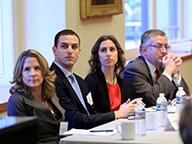Faculty News
—
In an op-ed, Profs. Roy Smith and Ingo Walter explain why improving bank culture helps defend against litigation
—

Excerpt from American Banker -- "The proliferation of settlements in an array of financial markets in recent years makes it clear that banks must show they have made credible and persistent efforts to keep their people in line. They must be able to demonstrate that they have organized themselves into proactively watchful and compliant organizations, with thousands of middle managers who are well trained, motivated and rewarded for spotting and fixing trouble before it happens. This functional approach to controlling behavior is the essence of the much-discussed cultural issue in banks."
Faculty News
—

Excerpt from American Banker -- "The proliferation of settlements in an array of financial markets in recent years makes it clear that banks must show they have made credible and persistent efforts to keep their people in line. They must be able to demonstrate that they have organized themselves into proactively watchful and compliant organizations, with thousands of middle managers who are well trained, motivated and rewarded for spotting and fixing trouble before it happens. This functional approach to controlling behavior is the essence of the much-discussed cultural issue in banks."



















